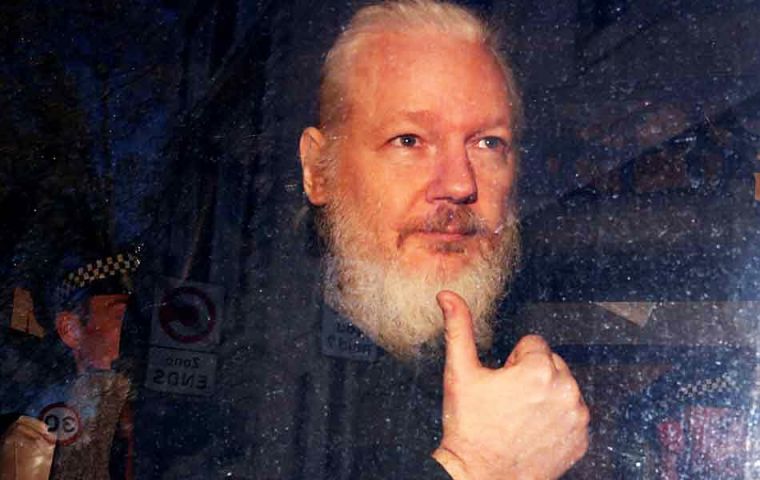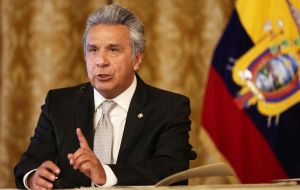MercoPress. South Atlantic News Agency
Assange arrested in London after Ecuadorean asylum is revoked; agreement not to extradite him to US
 Footage shot by Ruptly, a video news agency, showed an agitated, frail-looking Assange with white hair and a white beard being carried down the embassy steps
Footage shot by Ruptly, a video news agency, showed an agitated, frail-looking Assange with white hair and a white beard being carried down the embassy steps  “I can confirm that Julian Assange is now in police custody and rightly facing justice in the UK,” British Home Secretary Sajid Javid said on Twitter
“I can confirm that Julian Assange is now in police custody and rightly facing justice in the UK,” British Home Secretary Sajid Javid said on Twitter  UK has guaranteed to Ecuador that it will not be extraditing Assange to a country that has the death penalty, Ecuadorian President Lenin Moreno said
UK has guaranteed to Ecuador that it will not be extraditing Assange to a country that has the death penalty, Ecuadorian President Lenin Moreno said WikiLeaks founder Julian Assange was arrested by British police and carried out of the Ecuadorean embassy on Thursday after his South American hosts abruptly revoked his seven-year asylum, paving the way for his possible extradition to the United States.
The US alleged Assange engaged in 2010 conspiracy with Chelsea Manning, who served seven years in military prison for leaking classified data, and charged him with conspiracy to commit computer intrusion with a maximum penalty of five years.
Assange has been living at the embassy in London's plush Knightsbridge district since 2012 when he sought refuge there after being accused of sexual assault in Sweden, allegations that have since been dropped.
Footage shot by Ruptly, a video news agency, showed an agitated, frail-looking Assange with white hair and a white beard being carried down the embassy steps by at least seven men into a police van.
“I can confirm that Julian Assange is now in police custody and rightly facing justice in the UK,” British Home Secretary Sajid Javid said on Twitter.
“No one is above the law,” he wrote, thanking Ecuador for its “cooperation” in the long-running case. The 47-year-old Australian was due to appear in court later on Thursday. He faces prosecution for breaching the conditions of his bail in Britain in 2012.
The arrests, after nearly seven years holed up in a few cramped rooms at the embassy, mark one of the most peculiar turns in a tumultuous life that has transformed the Australian programmer into a rebel wanted by the US.
Assange's supporters said Ecuador had betrayed him at the behest of Washington, that the termination of his asylum was illegal and that they feared he would ultimately end up on trial in the US.
To some, Assange is a hero for exposing what supporters cast as abuse of power by modern states and for championing free speech. But to others, he is a dangerous rebel who has undermined US security.
Wikileaks angered Washington by publishing hundreds of thousands of secret US diplomatic cables that laid bare often highly critical US appraisals of world leaders, from Russian President Vladimir Putin to members of the Saudi royal family.
Assange made international headlines in early 2010 when Wikileaks published a classified US military video showing a 2007 attack by Apache helicopters in Baghdad that killed a dozen people, including two Reuters news staff.
It was not immediately clear what specifically prompted Ecuador to end Assange's stay in the embassy, or the extent of the diplomacy that led to the arrest. The Kremlin said it hoped his rights would not be violated.
Russia accused Britain of “strangling freedom” with Assange's arrest, in a Facebook message by foreign ministry spokeswoman Maria Zakharova.
WikiLeaks said Ecuador had illegally terminated his political asylum in violation of international law.
Britain has guaranteed to Ecuador, however, that it will not be extraditing Assange to a country that has the death penalty, Ecuadorean President Lenin Moreno said after the arrest.
“In line with our strong commitment to human rights and international law, I requested Great Britain to guarantee that Mr Assange would not be extradited to a country where he could face torture or the death penalty,” Moreno said in a video posted on Twitter.
“The British government has confirmed it in writing, in accordance with its own rules.”




Top Comments
Disclaimer & comment rulesCommenting for this story is now closed.
If you have a Facebook account, become a fan and comment on our Facebook Page!